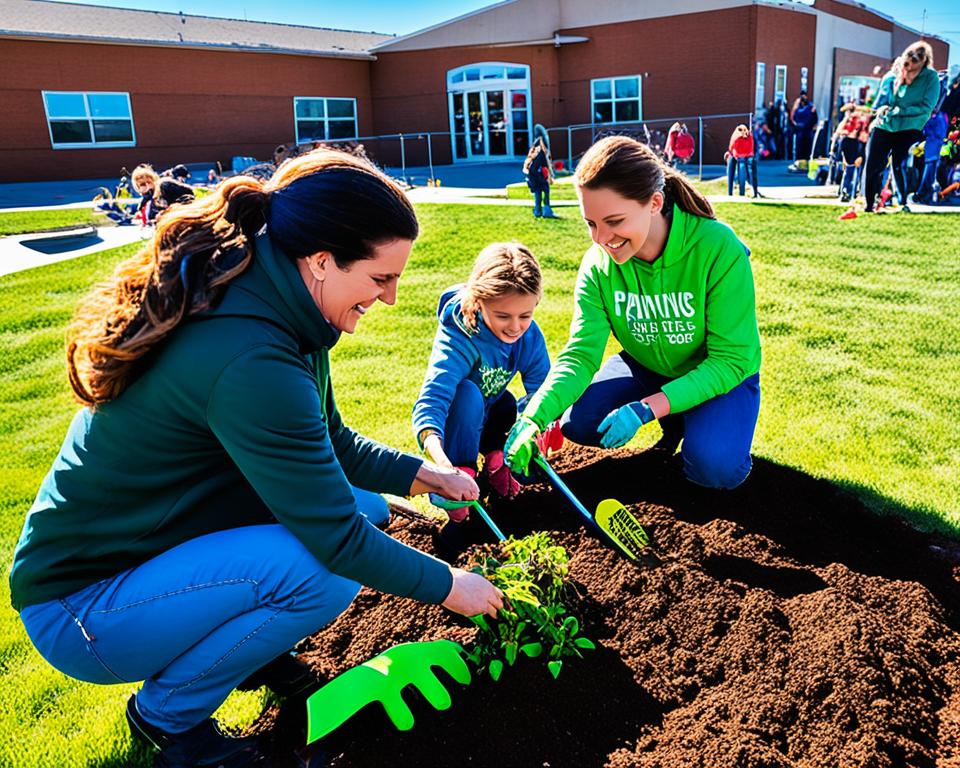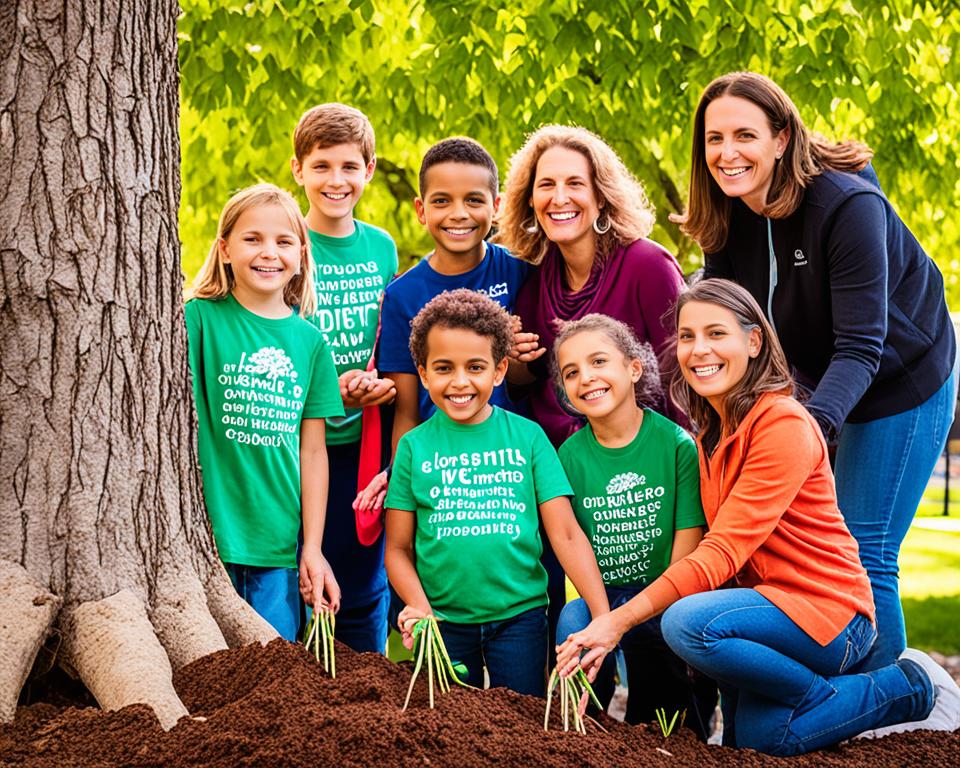Welcome to “The Grove of Growth Mindset: Planting Seeds of Resilience and Adaptability.” In this journey through the world of education, we will explore the profound impact of a growth mindset on students’ learning and achievement, and the crucial role that resilience and adaptability play in fostering success.
Education is not just about acquiring knowledge; it is about equipping students with the mindset and skills to navigate the challenges and opportunities that lie ahead. The concept of a growth mindset, popularized by psychologist Carol Dweck, offers a powerful framework for nurturing students’ potential and instilling a belief in their ability to grow, learn, and overcome obstacles.
Through this article, we will delve into the definition and importance of a growth mindset, explore its impact on learning and achievement, and examine the contrasting patterns of growth and fixed mindsets. We will also explore the vital role of parental involvement in building students’ resilience, and strategies for effective parent-teacher collaboration. Additionally, we will discuss the role of setbacks in cultivating adaptability and empowering parents in education.
Join me as we explore the fascinating world of growth mindset, resilience, and adaptability in education. Together, we will uncover practical techniques, real-life stories, and successful initiatives that empower parents, build strong family engagement, and nurture resilient communities. Let’s embark on this enriching journey of lifelong learning and adaptability.
Key Takeaways:
- Growth mindset is a powerful framework that fosters resilience and adaptability in education.
- A growth mindset promotes the belief in students’ ability to grow, learn, and overcome challenges.
- Parental involvement and effective collaboration with teachers play a crucial role in building students’ resilience.
- Setbacks are necessary in cultivating adaptability and learning from failure.
- Empowering parents in education and fostering strong family engagement contribute to student success.
Understanding the Growth Mindset
Developing a growth mindset is a critical aspect of personal and academic growth. It involves embracing challenges, overcoming obstacles, and continuously expanding one’s abilities. To fully comprehend the power of a growth mindset, it’s essential to delve into its definition, explore its importance, and understand the impact it has on learning and achievement.
Defining Growth Mindset and Its Importance
A growth mindset is the belief that intelligence, abilities, and skills are not fixed traits but can be developed through dedication, effort, and perseverance. Individuals with a growth mindset see failure as a stepping stone to success and view challenges as opportunities for growth. This mindset fosters resilience, adaptability, and a passion for lifelong learning.
The importance of a growth mindset cannot be overstated. Embracing a growth mindset fuels personal and academic growth. It empowers individuals to set higher goals, persist in the face of setbacks, and take on challenges with confidence. A growth mindset empowers individuals to maximize their potential and reach new heights of achievement.
Impact of Growth Mindset on Learning and Achievement
Research has shown that individuals with a growth mindset are more likely to approach learning as a journey of continuous improvement. They embrace mistakes as opportunities for learning, seek out feedback, and actively engage in self-reflection. This mindset enhances the quality of learning, improves problem-solving skills, and fosters a love for learning.
Furthermore, a growth mindset has a significant impact on academic achievement. Students with a growth mindset tend to perform better academically, as they believe that their abilities can be developed through effort and effective strategies. They are more motivated, resilient, and demonstrate higher levels of perseverance in the face of challenges.
Growth vs. Fixed Mindset: Patterns and Examples
It is crucial to understand the distinction between a growth mindset and a fixed mindset. In a fixed mindset, individuals believe that their abilities are fixed traits and cannot be significantly developed. They often avoid challenges, fear failure, and struggle to recover from setbacks.
On the other hand, individuals with a growth mindset embrace challenges, persist in the face of adversity, and believe in the power of effort and learning. They view setbacks as opportunities for growth, seek feedback, and continuously strive for improvement.
| Growth Mindset | Fixed Mindset |
|---|---|
| Embraces challenges | Avoids challenges |
| Sees effort as necessary for success | Believes abilities are fixed, regardless of effort |
| Thrives on feedback | Views feedback as criticism |
| Persists in the face of setbacks | Struggles to recover from setbacks |
The table above highlights the contrasting patterns between a growth mindset and a fixed mindset. By cultivating a growth mindset, individuals can unlock their full potential, overcome challenges, and achieve remarkable personal and academic growth.
Fostering Resilience through Parental Involvement in Schools
In order to build student resilience and promote success, parental involvement in schools is crucial. Parents play a vital role in shaping their child’s educational journey and fostering their resilience. By actively participating in their child’s education, parents can collaborate with teachers and provide the necessary support for their child’s growth and development.
The Role of Parents in Building Student Resilience
Parents have a significant impact on their child’s resilience. By creating a nurturing and supportive home environment, parents help their children develop the necessary skills and mindset to overcome challenges and bounce back from setbacks. When parents actively engage in their child’s education, they serve as role models and provide emotional support, boosting their child’s self-esteem and resilience.
Strategies for Parent-Teacher Collaboration
Collaboration between parents and teachers is essential for building student resilience. Open and effective communication channels should be established between parents and teachers to ensure a holistic approach to their child’s education. Regular parent-teacher conferences, progress updates, and parent involvement in school activities can promote collaboration and enable parents to monitor their child’s progress and address any challenges that may arise.

Enhancing Student Success Through Parental Support
Parental support plays a critical role in promoting student success. By actively engaging in their child’s academic journey, parents can provide the necessary assistance, resources, and guidance to help their child excel. This support can include helping with homework, encouraging a love for learning, and fostering a positive attitude towards education. When parents are involved and supportive, students are more likely to develop resilience, achieve academic goals, and navigate challenges with confidence.
The Role of Setbacks in Cultivating Adaptability
Setbacks are an inevitable part of life. They can be disheartening and challenging, but they also hold immense potential for growth and development. In the context of cultivating adaptability, setbacks play a crucial role in shaping individuals’ ability to navigate through adversity and embrace change.
When faced with setbacks, individuals are presented with opportunities to learn, reflect, and adjust their approach. These challenges provide valuable insights into one’s strengths and weaknesses, allowing for self-improvement and the acquisition of new skills. Adaptability, in essence, is the ability to bounce back from setbacks and thrive in the face of uncertainty.
By experiencing setbacks, individuals develop resilience, which is the capacity to recover quickly from difficulties. Resilience enables individuals to persevere in the face of obstacles, view setbacks as temporary hurdles, and maintain a positive mindset. It fosters a sense of determination and grit, empowering individuals to push forward and adapt to new circumstances.
Moreover, setbacks offer valuable lessons in problem-solving and decision-making. They force individuals to reassess their strategies, think creatively, and explore alternative paths. This process of adaptation builds mental agility and resourcefulness, enhancing individuals’ ability to navigate complex situations and seize opportunities.
Cultivating adaptability through setbacks requires a growth mindset. A growth mindset is the belief that one’s abilities and intelligence can be developed through dedication and hard work. Individuals with a growth mindset view setbacks as opportunities for learning and growth, rather than as indicators of failure. This mindset encourages individuals to persevere, embrace challenges, and continuously seek improvement.
In conclusion, setbacks are not roadblocks but stepping stones toward cultivating adaptability. They provide opportunities for resilience, learning, and personal growth. By fostering a growth mindset and embracing setbacks as valuable learning experiences, individuals can develop their adaptability and thrive in an ever-changing world. Let’s explore further in the next section the importance of empowering parents in education.
Empowering Parents in Education
Empowering parents in education is crucial for fostering student success and creating a strong learning foundation. When parents are equipped with the right resources, encouraged to engage in home-school partnerships, and communicate effectively with teachers, the impact on student achievement is significant.
Equipping Parents with Education Resources
Providing parents with access to education resources is essential for their empowerment in supporting their child’s learning journey. From online learning platforms and educational apps to books and workshops, these resources enable parents to stay involved in their child’s education and contribute to their academic growth. By understanding the curriculum, learning strategies, and assessment methods, parents can confidently guide their child’s learning at home.
Encouraging Home-School Partnerships for Student Achievement
Home-school partnerships play a vital role in shaping student achievement. When schools and parents work together as a team, students receive consistent support, encouragement, and guidance both inside and outside the classroom. Collaborative efforts such as parent-teacher conferences, open houses, and school events provide opportunities for parents to actively engage with the school community and foster a sense of belonging. These partnerships create a positive and nurturing environment that fosters academic growth and social-emotional development.

Effective Parent-Teacher Communication and Its Impact
Effective communication between parents and teachers is the cornerstone of successful education. It allows for the exchange of valuable information, identification of individual student needs, and proactive problem-solving. Regular communication channels, such as emails, newsletters, and parent-teacher meetings, facilitate ongoing dialogue about a child’s progress, challenges, and strengths. By fostering a culture of collaboration and open communication, parents and teachers can work together to provide the best possible education for the child.
Planting Seeds of Empathy and Emotional Intelligence
Empathy and emotional intelligence play a crucial role in the development of individuals and communities. By cultivating these qualities, we can create a more compassionate society where understanding and acceptance prevail. In the context of education, it is essential to sow the seeds of empathy and emotional intelligence early on, nurturing these qualities in children and fostering their growth throughout their academic journey.
Empathy allows individuals to connect with others on a deeper level, understanding and sharing their emotions and experiences. It enables children to develop interpersonal skills, compassion, and a sense of social responsibility. Teaching empathy in schools can help create an inclusive and supportive environment where students feel valued and understood.
Emotional intelligence, on the other hand, involves recognizing and managing one’s own emotions as well as understanding and responding to the emotions of others. This skill is crucial for building healthy relationships, resolving conflicts, and making responsible decisions. By promoting emotional intelligence in education, we equip students with the tools they need to navigate their emotions and relationships effectively.
Integrating empathy and emotional intelligence into the curriculum can be done through various approaches, such as storytelling, role-playing, and collaborative projects. Engaging students in activities that encourage perspective-taking and active listening can help them develop a deeper understanding of others. Furthermore, providing opportunities for self-reflection and promoting discussions about feelings and emotions can enhance emotional intelligence.
Research has shown that teaching empathy and emotional intelligence in schools leads to positive outcomes, including improved academic performance, reduced bullying, and increased prosocial behavior. By planting these seeds of empathy and emotional intelligence, we are not only empowering students with essential life skills but also cultivating a more empathetic and emotionally intelligent society.
So let’s embark on this journey of nurturing empathy and emotional intelligence in our education system. Together, we can create a world where empathy is celebrated, emotional intelligence is valued, and understanding is a cornerstone of our interactions.
Building Strong Family Engagement in Learning
Family engagement plays a crucial role in supporting student success and academic achievement. When families are actively involved in their children’s education, it creates a strong support system that fosters a positive learning environment both at school and at home.
Designing Inclusive Education Strategies for Families
Inclusive education strategies aim to create an inclusive learning environment that embraces the diversity of students and their families. These strategies prioritize collaboration and cooperation between educators and families to ensure that every student feels valued, included, and empowered to achieve their full potential. By designing education strategies that are inclusive and accessible, we can foster a sense of belonging and provide equitable learning opportunities for all students and their families.
To effectively design inclusive education strategies, educators should:
- Recognize and appreciate the diverse backgrounds, cultures, and learning styles of students and families.
- Adapt teaching methods and materials to meet the individual needs of students and engage their families in the learning process.
- Provide regular communication and opportunities for families to actively participate in decision-making processes and contribute their insights and experiences.

Parental Engagement Programs and Their Effectiveness
Parental engagement programs are initiatives that aim to involve parents in their children’s education and create strong partnerships between families and schools. These programs provide opportunities for parents to actively participate in their children’s learning journey, empowering them to support their academic progress.
Research shows that parental engagement programs have a positive impact on student outcomes, including improved academic performance, increased attendance rates, and enhanced social-emotional development. These programs promote a sense of shared responsibility between parents and educators, allowing for collaborative efforts in promoting student success.
Overcoming Barriers to Parent Involvement in Schools
Despite the benefits of family engagement, there may be barriers that hinder parents’ involvement in schools. Recognizing and addressing these barriers is essential to ensure that all families can actively participate in their children’s education.
Some common barriers to parent involvement include:
- Limited access to information and resources
- Language barriers
- Time constraints
- Cultural differences and misunderstandings
- Lack of awareness and understanding of the importance of parent involvement
By implementing strategies such as providing translated materials, offering flexible meeting times, and fostering a culturally inclusive environment, schools can help overcome these barriers and encourage meaningful parent involvement in their children’s education.
Adaptation Techniques: Real-Life Stories of Change
Adaptation is a fundamental skill that allows individuals and communities to thrive in an ever-changing world. When faced with challenges, the ability to adapt and find creative solutions can lead to remarkable transformations. In this section, we will explore real-life stories of change and the adaptation techniques that played a pivotal role in these inspiring journeys.
Throughout history, individuals and organizations have demonstrated remarkable resilience and adaptability. From personal triumphs to successful business ventures, these stories serve as a testament to the power of embracing change and finding innovative ways to overcome obstacles.
“Adaptation is not about avoiding failure, but rather about learning from it and growing stronger.” – [Author Name]
One such example is the story of [Real-Life Story 1], who turned their personal setback into an opportunity for growth. Through perseverance, resilience, and a commitment to personal development, they were able to adapt to new circumstances and achieve remarkable success.
A similar tale of adaptability is found in the journey of [Real-Life Story 2]. In the face of adversity, they employed innovative strategies and embraced change, ultimately transforming their lives and inspiring those around them.
These real-life stories of change highlight the importance of adaptation techniques such as:
- Embracing a growth mindset: By adopting a growth mindset, individuals can develop the belief that their abilities can be improved through dedication and hard work. This mindset shift allows for greater adaptability and resilience in the face of challenges.
- Seeking new perspectives: Changing circumstances often require a fresh perspective. By seeking new ideas and opinions, individuals can gain valuable insights that enable them to adapt and find innovative solutions.
- Thinking outside the box: Adapting to change often requires thinking creatively and exploring unconventional approaches. By challenging traditional norms and exploring new possibilities, individuals can uncover transformative solutions.
These adaptation techniques have the potential to unlock incredible possibilities for personal growth, professional success, and community resilience. By learning from the real-life stories of change, we can draw inspiration and apply these techniques to our own lives, fostering a culture of adaptability and resilience.
| Real-Life Story | Adaptation Techniques |
|---|---|
| [Real-Life Story 1] | [Adaptation Technique 1], [Adaptation Technique 2], [Adaptation Technique 3] |
| [Real-Life Story 2] | [Adaptation Technique 1], [Adaptation Technique 2], [Adaptation Technique 3] |
Encouraging Parental Participation in Academics
When it comes to a child’s education, parental involvement plays a crucial role in fostering academic success and overall development. Empowering parents to play an active role in their child’s education not only strengthens the parent-child bond but also enhances the learning experience and outcomes.
Empowering Parents to Play an Active Role in Education
Parents are their children’s first teachers and have a unique insight into their strengths, weaknesses, and learning styles. By actively participating in their child’s academics, parents can provide valuable support and guidance tailored to their child’s individual needs. Whether it’s helping with homework, attending parent-teacher conferences, or engaging in regular communication with teachers, parents can contribute significantly to their child’s educational journey.
Creating Opportunities for Parent-Led Initiatives
Parent-led initiatives are an effective way to encourage parental participation in academia. These initiatives can take various forms, such as parent-led workshops, educational programs, or extracurricular activities. By involving parents in the planning and execution of such initiatives, schools create a collaborative environment where parents can contribute their expertise and knowledge, fostering a sense of ownership and investment in their child’s education.
Parent Volunteering: A Win-Win for Schools and Families
Volunteering in schools not only benefits the educational institution but also offers numerous advantages to parents and families. When parents volunteer their time and skills, they actively demonstrate the value they place on education, setting a positive example for their children. Additionally, parent volunteering provides an opportunity for parents to engage with the school community, build relationships with teachers and staff, and gain a deeper understanding of their child’s academic environment.
By encouraging parental participation in academics, schools create a strong support system that positively impacts students’ learning and overall academic experience. Active parental involvement not only helps children thrive academically but also fosters a sense of shared responsibility between parents, teachers, and the educational community.
Nurturing a Resilient Community: The Power of Collective Effort
Building community resilience is not an individual endeavor, but rather a collective effort that requires the active participation and collaboration of community members. By nurturing a resilient community, we can create a supportive and empowering environment that can weather challenges and bounce back from setbacks.
Community resilience is the ability of a community to adapt, recover, and thrive in the face of adversity. It involves fostering strong social connections, promoting communication and cooperation, and implementing strategies that enhance the well-being of community members.
One of the key ingredients for nurturing a resilient community is collective effort. It is through the combined contributions and shared responsibility of individuals, organizations, and institutions that community resilience can be strengthened. When everyone works together towards a common goal, the impact is greater and the outcomes more sustainable.
In a resilient community, individuals support and uplift one another, creating a network of mutual aid and support. This can be through acts of kindness, volunteering, or providing resources to those in need. By coming together, we can pool our strengths and resources, making our community more resilient as a whole.
Collective effort also means fostering partnerships between different sectors of the community, such as schools, businesses, non-profit organizations, and government agencies. By collaborating and leveraging the unique strengths of each sector, we can create comprehensive and sustainable solutions to community challenges.
Furthermore, collective effort involves empowering community members to actively participate in decision-making processes that affect them. By ensuring that the voices and perspectives of all community members are heard and respected, we can foster a sense of ownership and collective responsibility, leading to greater community resilience.
Together, through collective effort, we can nurture a resilient community that not only survives but thrives in the face of adversity. By building strong social connections, promoting collaboration, and empowering individuals, we can create a community where everyone has the support and resources they need to overcome challenges and achieve their full potential.
Supporting Parents in Student Success: Case Studies and Programs
Parents play a crucial role in supporting their children’s success in education. Through collaboration with education authorities and participation in global initiatives, parents can access valuable resources and programs that enhance their ability to support their children’s learning journey. This section explores case studies of local programs making a difference, education authorities’ support mechanisms for parents, and the lessons we can learn from international success stories.
Case Study: Local Programs Making a Difference
Local communities around the world have developed innovative programs to support parents in their efforts to foster student success. These programs provide parents with resources, guidance, and opportunities to engage actively in their children’s education. By highlighting these case studies, parents can gain insights and inspiration from real-life examples.
Education Authorities’ Support Mechanisms for Parents
Education authorities are increasingly recognizing the importance of supporting parents in student success. They have implemented various support mechanisms such as workshops, seminars, and online platforms to provide parents with valuable information and strategies. These initiatives aim to empower parents to become active partners in their children’s education and create a strong home-school connection.
Global Initiatives: Learning from International Success Stories
Across the globe, numerous successful initiatives have been implemented to support parents in their role as partners in education. By exploring these global initiatives, parents can gain insights into different approaches and best practices for supporting student success. Learning from international success stories can help parents adopt effective strategies and tailor them to their specific cultural and educational contexts.
Conclusion
In conclusion, the growth mindset and resilience play crucial roles in education, shaping the success and well-being of students. Embracing a growth mindset, characterized by a belief in continuous improvement and the power of effort, empowers students to overcome challenges and achieve their full potential. Resilience, the ability to bounce back from setbacks and adapt to change, equips students with the skills needed to thrive in a rapidly evolving world.
Looking ahead, there are exciting future directions for empowering parents and communities in the field of education. By fostering strong partnerships between parents, teachers, and schools, we can create a collaborative environment that supports student learning and development. Encouraging parental involvement through effective communication, education resources, and parent-led initiatives will enhance student success and create a shared responsibility for education.
As we reflect on the journey of lifelong learning and adaptability, we recognize the importance of nurturing empathy and emotional intelligence. By planting seeds of empathy, we foster a sense of compassion and understanding, building stronger connections within our communities. Building strong family engagement in learning and overcoming barriers to parent involvement also contribute to creating inclusive and supportive educational environments.
Bringing together real-life stories of change and showcasing adaptation techniques, we inspire and motivate parents, students, and educators alike. By celebrating the successes and learnings of others, we showcase the power of resilience and the growth mindset in action. As we continue on this path, nurturing a resilient community through collective effort will ensure that education remains a transformative force for generations to come.
